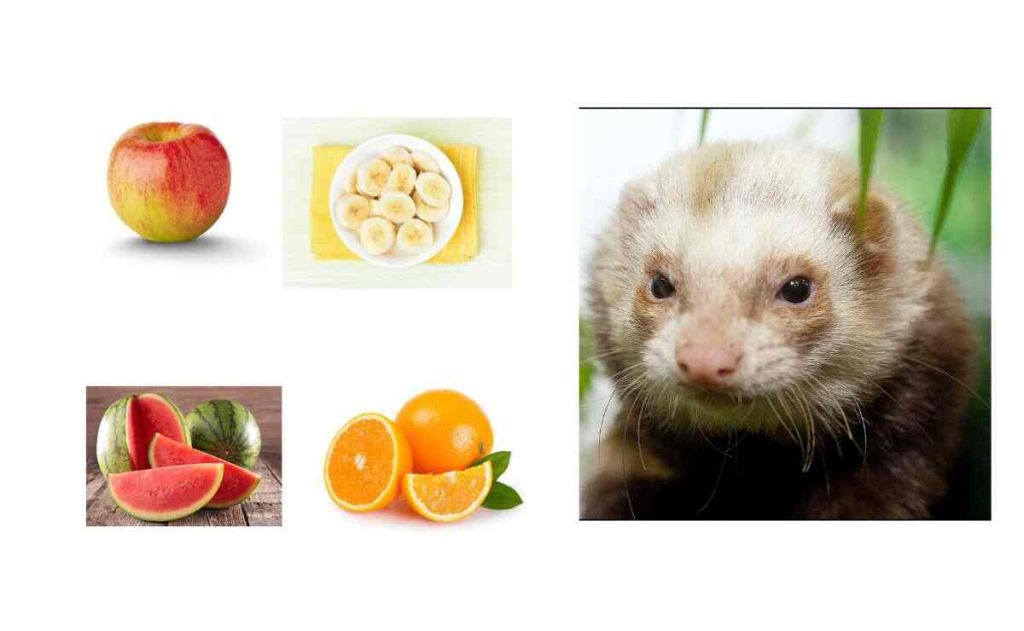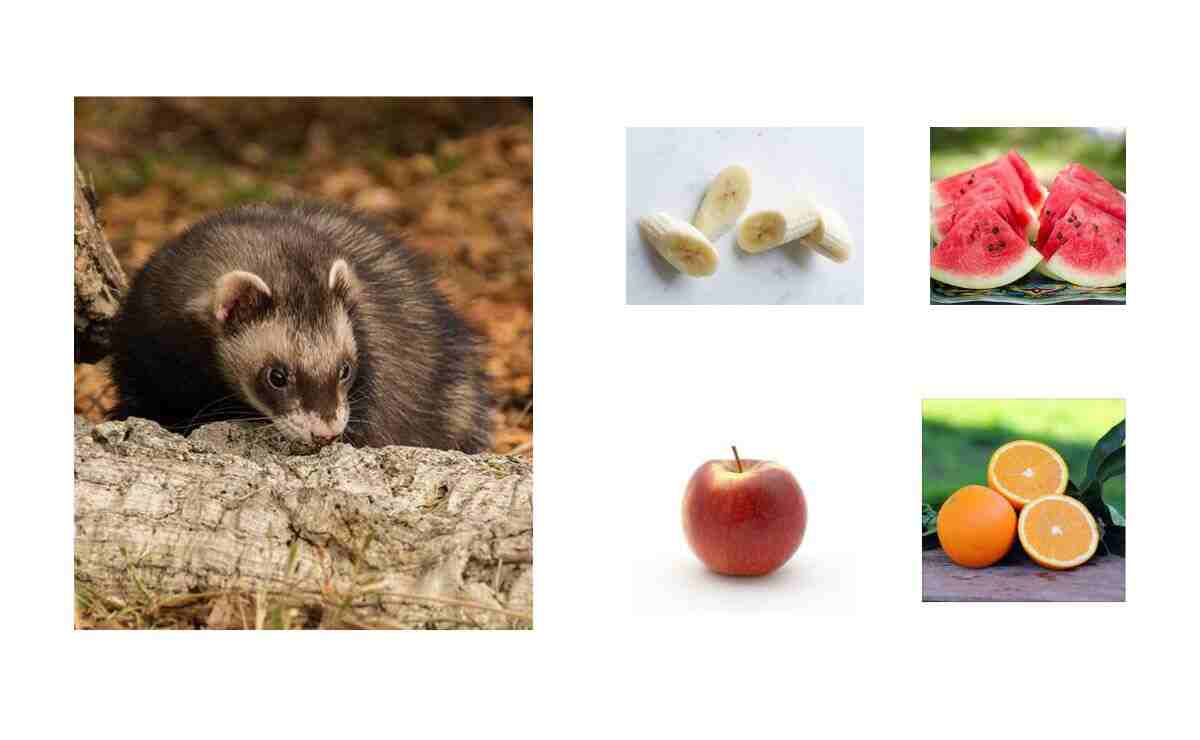Ferrets are strictly carnivorous. The primary source of nutrition is any type of meat foods and fulfill all their dietary requirement from these foods. Ferret’s digestive tract successfully consumes protein, vitamins, and other nutritional ingredients that are found in real meat.
However, many pet parents want to share fruit-based snacks with their ferrets. Though ferrets can eat a small portion of fruits and vegetables, the common question is what fruits can ferrets eat. So this guide will give you the answer.
Can Ferrets Eat Fruits?
Ferrets diet should have 33% of protein and only meat has that much protein. Ferrets require higher protein that any other pet in their category. They can eat fruits but it is not mean fruits can be alternative to meat.
Fruits are full of fiber, vitamin C, and many other minerals. They are low in fat and calorie. So fuits can be a good snack for your ferrets. Also, the antioxidants in fruits keep your ferret’s skin healthy.
Unlike some pets, ferrets lack a cecum, a crucial digestive organ for processing carbohydrates found in fruits. This means they lack the ability to digest complex carbohydrates, sugars, and fiber efficiently. Feeding them fruits in abundance can lead to serious health issues.
For their best health, ferrets should primarily consume high-quality, meat-based ferret food. This aligns with their carnivorous nature and ensures they receive the nutrients essential for their well-being.
What Fruits Can Ferrets Eat?

While it’s true that most fruits are packed with nutrients, it’s essential to know which ones are safe for your ferret. So here are some fruits that can benefit your ferret’s health while providing a delightful treat.
Bananas
Bananas, with their delightful sweetness, are more than just a tasty treat for ferrets. They have potassium, vitamin C, B6, manganese, biotin, and copper.
The magnesium content in bananas further aids in efficient vitamin absorption and supports robust bone growth. When considering bananas as a treat, moderation is key to preventing potential digestive issues.
Apples
Moving on to apples, these crisp and refreshing fruits are a wonderful addition to your ferret’s diet. Low in protein and high in fiber, apples are an excellent choice for ferrets. The low calories make them a versatile snack that ensures your ferret’s digestive health as well as satisfying his taste buds.
Cantaloupe
Cantaloupe is a popular fruits for its succulent sweetness. They bring a wealth of vitamins and minerals. Rich in vitamin A, beta carotene, vitamins B-6 and C, fiber, folate, niacin, and potassium, cantaloupe boasts anti-cancer properties and cell-protecting qualities. But don’t feed the peel of the cantaloupe as it can pose intestinal damage.
Cucumbers
For ferrets watching their weight, cucumbers work as a hydrating and low-calorie snack. Beyond their hydrating properties, cucumbers are packed with essential vitamins and minerals, including vitamin K. This makes them an ideal choice for overweight ferrets, providing nutrition without contributing to excess calorie intake.
Pineapple
Fresh pineapple introduces a tropical flair to your ferret’s treat repertoire. They have vitamins, minerals, and fiber. So it is often consider a nutrient-dense option.
But your ferrets may have nausea and diarrhea if they eat too much pineapple. So give them a small portion of pineapple at a time.
Watermelon
Watermelon is the safest fruit for your ferrets. But you need to serve it without rind or seeds. They are not safe for your ferrets. It can cause choking hazard and other digestive problem. However, watermelon is a low-calorie treat rich in nutrients like vitamin A and C which may cause digestive problems in ferrets.
Pumpkin
In the realm of low-calorie, high-fiber options, pumpkin takes center stage. Beyond its nutritional benefits, pumpkin is known for its effectiveness in treating ferrets with abnormal stools. Whether you are giving it your ferret as treats or used as a standalone snack, pumpkin is a safe and healthy addition to their diet.
Oranges
Oranges provide a spectrum of nutrients for ferrets. They have vibrant citrusy flavor with fiber, potassium, calcium, folic acid, iron, flavonoids, phytonutrients, and vitamins A, C, B1, and B6. However, be careful to prevent stomach upset – offer small segments, and remove the rind and seeds. Never include any part of the orange tree in your ferret’s diet.
Pears
Before presenting pears to your ferret, a bit of preparation is necessary. Peel and de-seed them to ensure a safe and enjoyable treat. Pears contribute vitamin A, vitamin C, and potential anti-cancer properties to your ferret’s diet, making them a nutritious choice when introduced thoughtfully.
Cranberries
Cranberries add a unique flavor to the ferret’s palate. While the tart taste may not be universally appealing, cranberries are rich in vitamin C, manganese, and fiber. Ferrets can consume them raw, cooked, or dried, but it’s essential to avoid cranberry juice or sauce due to their sugar content.
Which Fruits Are Not Safe For Ferrets?
You should avoid acidic fruits and they can pose a threat to your ferret’s digestive health. They can potentially lead to a cascade of issues such as diarrhea, weight loss, dehydration, and even malnutrition.
Grapefruits: These frits are a strict no-no for ferrets. The acidity levels in grapefruits can wreak havoc on a ferret’s sensitive digestive system.
Grapes: Despite their small size and sweet appeal, grapes are another fruit that should be omitted from your ferret’s diet. Grapes, both red and green varieties, contain compounds that can be toxic to ferrets and other pets.
Lemons, Limes: While lemons may add zesty flavor, they are far from suitable for ferret consumption. Lemons, like other acidic fruits, can upset the delicate balance of your ferret’s digestive system.
What is the best way to give fruits to ferrets?
While fruits can be a delightful treat, moderation is key to prevent potential digestive issues.
You should give fruits as occasional treats rather than a regular part of your ferret’s daily meals.
It is best to give fruits once in a day and two or three times a week is generally sufficient for ferrets. When giving fruits, offer small, bite-sized portions. Ferrets have small digestive systems, and consuming large quantities of fruits may lead to digestive upset, including diarrhea.
Pay attention to how your ferret responds to different fruits. If you notice any signs of digestive discomfort, such as loose stools, it may be an indication to adjust the type or frequency of fruit treats. Always consult with your veterinarian before introducing new foods, including fruits, to your ferret’s diet.
Conclusion
Ferret can get nutrition from fruits and get chewing satisfaction from eating fruits. Every ferret is unique, and individual dietary requirements.
So before giving fruits to your ferrets, you should consider vet recommendation.
